LEGO Rock Raiders (video game): Difference between revisions
No edit summary |
|||
| Line 30: | Line 30: | ||
| 2 Levels<ref name="PC manual p62"/> | | 2 Levels<ref name="PC manual p62"/> | ||
|- | |- | ||
| colspan=3 | The Teleport Pad can teleport down Rock Raiders and Small Vehicles (except for the Rapid Rider). Rock Raiders can train as Pilots at it. Although it is the first building unlocked after the Tool Store, it requires power to function, and the Support Station must be constructed before it can teleport down the the Hover Scout, Small Digger, and Small Transport Truck. Upgrading it to Level 1 unlocks the Docks and Power Station. Upgrading it to Level 2 is required to teleport down the Small Mobile Laser Cutter and Tunnel Scout.<ref name="PC manual p62"/> | | colspan=3 | The Teleport Pad can teleport down Rock Raiders and Small Vehicles (except for the Rapid Rider). Rock Raiders can train as Pilots at it. Although it is the first building unlocked after the Tool Store, it requires power to function, and the Support Station must be constructed before it can teleport down the the Hover Scout, Small Digger, and Small Transport Truck. Upgrading it to Level 1 unlocks the Docks and Power Station. Upgrading it to Level 2 is required to teleport down the Small Mobile Laser Cutter and Tunnel Scout.<ref name="PC manual p62"/><ref name="CFG HelpWindowInfo"/> | ||
|- | |- | ||
| rowspan=2 align=center style="background:#fff" | [[File:RR manual Docks.png|100px]]<br>[[Docks]] | | rowspan=2 align=center style="background:#fff" | [[File:RR manual Docks.png|100px]]<br>[[Docks]] | ||
Revision as of 07:53, 18 April 2023
LEGO Rock Raiders is a 1999 video game developed by Data Design Interactive and published by LEGO Media International for Microsoft Windows and PlayStation. The game is based on and was developed alongside the LEGO theme of the same name. It features a team of space explorers mining for energy crystals on a hostile alien planet.
Gameplay
Windows version
The Windows version of LEGO Rock Raiders is a real-time strategy game.
Buildings
LEGO Rock Raiders features ten different buildings. Nearly every mission starts with a Tool Store, which is required to construct all other buildings.
Below is a list of all buildings found in the game. The table lists each building with an official render of it (not always accurate to their in-game appearance), the cost of each building in Energy Crystals and Ore (or Building Studs), what units are required (followed by the unit's Level in brackets) before the building can be built, how many times the building can be upgraded, and a description.
| Building | Cost | Dependency | Upgrades |
|---|---|---|---|
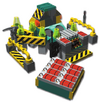 Tool Store |
None[1] | Rock Raider[1] | 2 Levels[1] |
| The Tool Store is the first building the player will start with in missions, and is required for all other buildings and vehicles. It can teleport down Rock Raiders and supply them with tools and construction materials, and stores any collected Energy Crystals and Ore.[1] Rock Raiders can upgrade at it, allowing them to carry more tools.[2] Upgrading the Tool Store to Level 1 unlocks the Teleport Pad. Upgrading it to Level 2 allows Rock Raiders to train as Explosives Experts at it.[1] | |||
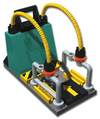 Teleport Pad |
8 Ore (2 Building Studs)[3] | Rock Raider, Tool Store (L1)[4] | 2 Levels[3] |
| The Teleport Pad can teleport down Rock Raiders and Small Vehicles (except for the Rapid Rider). Rock Raiders can train as Pilots at it. Although it is the first building unlocked after the Tool Store, it requires power to function, and the Support Station must be constructed before it can teleport down the the Hover Scout, Small Digger, and Small Transport Truck. Upgrading it to Level 1 unlocks the Docks and Power Station. Upgrading it to Level 2 is required to teleport down the Small Mobile Laser Cutter and Tunnel Scout.[3][5] | |||
 Docks |
1 Energy Crystal, 8 Ore (2 Building Studs)[6] | Rock Raider, Tool Store (L1), Teleport Pad (L1)[4] | None[6] |
| The Docks is used to teleport down water-based vehicles. It must be built next to water. Rock Raiders can train as Sailors at it.[6] While it can teleport down the Rapid Rider once it is powered,[7] a Level 2 Support Station and Level 1 Super Teleport are required before it can teleport down the Cargo Carrier.[8] | |||
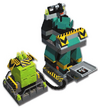 Power Station |
2 Energy Crystals, 12 Ore (3 Building Studs)[9] | Rock Raider, Tool Store (L1), Teleport Pad (L1)[4] | 1 Level[9] |
| The Power Station supplies power to all other buildings connected to it via Power Paths.[9][10] Additionally, Electric Fences can be placed once it has been constructed.[11] Upgrading it to Level 1 unlocks the Support Station, Upgrade Station, Geological Center, and Ore Refinery.[4] | |||
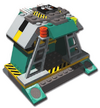 Support Station |
3 Energy Crystals, 15 Ore (3 Building Studs)[12] | Rock Raider, Tool Store (L1), Teleport Pad (L1), Power Station (L1)[4] | 2 Levels[12] |
| The Support Station refills the air supply in missions where it can run out. One Support Station can produce enough air for ten Rock Raiders. Rock Raiders can train as Drivers at it, and will also automatically go to it to eat when they are hungry.[12] Upgrading it to Level 1 unlocks the Mining Laser and Super Teleport. Upgrading it to Level 2 is required to teleport down Large Vehicles at the Super Teleport.[4] | |||
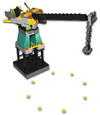 Upgrade Station |
3 Energy Crystals, 20 Ore (4 Building Studs)[13] | Rock Raider, Tool Store (L1), Teleport Pad (L1), Power Station (L1)[4] | 1 Level[13] |
| The Upgrade Station can upgrade vehicles. Rock Raiders can train as Engineers at it. Upgrading it to Level 1 halves the amount of time it takes for it to upgrade vehicles.[13][14] | |||
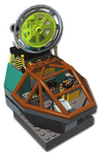 Geological Center |
3 Energy Crystals, 15 Ore (3 Building Studs)[15] | Rock Raider, Tool Store (L1), Teleport Pad (L1), Power Station (L1)[4] | 2 Levels[15] |
| The Geological Center scans a much larger area than Rock Raiders and vehicles can. Rock Raiders can train as Geologists at it. It can be upgraded twice to increase its scanner range.[15] At Level 1 it scans one and one-third its original scanning radius, and at Level 2 it scans twice its original radius.[16] | |||
 Ore Refinery |
3 Energy Crystals, 20 Ore (4 Building Studs)[17] | Rock Raider, Tool Store (L1), Teleport Pad (L1), Power Station (L1)[4] | 3 Levels[17] |
| The Ore Refinery processed Ore into Building Studs. Five pieces of Ore create one Building Stud. It can be upgraded three times to decrease the amount of Ore required to four, three, and finally two pieces per Building Stud.[17] | |||
 Mining Laser |
1 Energy Crystal, 15 Ore (3 Building Studs)[18] | Rock Raider, Tool Store (L1), Teleport Pad (L1), Power Station (L1), Support Station (L1)[4] | 1 Level[18] |
| The Mining Laser is a turret with a laser beam that can cut through rock walls. Four laser blasts drain one Energy Crystal.[18] Click on the building while it is already selected to enter or exit firing mode.[19] Upgrading it adds a second laser.[5] | |||
 Super Teleport |
2 Energy Crystals, 20 Ore (4 Building Studs)[20] | Rock Raider, Tool Store (L1), Teleport Pad (L1), Power Station (L1), Support Station (L1)[4] | 1 Level[20] |
| The Super Teleport can teleport down Large Vehicles (except for the Cargo Carrier).[20] A Level 2 Support Station is required before it can teleport down the Loader Dozer and Granite Grinder.[4] Upgrading it to Level 1 is required to teleport down the Large Mobile Laser Cutter, Chrome Crusher, and Cargo Carrier.[20] | |||
Vehicles
LEGO Rock Raiders features eleven vehicles that the player can teleport down during missions. These vehicles can assist Rock Raiders in completing tasks faster or help Rock Raiders reach places that would otherwise be inaccessible. The vehicles are divided between two menus, with six classified as "Small Vehicles" and five as "Large Vehicles". There is also the Tunnel Transport, which cannot be teleported and only appears briefly at the end of the mission Frozen Frenzy. Most of the vehicles appear in LEGO Rock Raiders sets, with the exception of the two Mobile Laser Cutters, the Tunnel Scout, and the Cargo Carrier.
Below is a list of all vehicles in the game. Vehicle names are listed along with official renders (not always accurate to in-game appearances). "Cost" lists how many Energy Crystals will be removed from storage when teleporting the vehicle down; Energy Crystals can be recovered by teleporting the vehicle out. "Dependency" lists what units are required (along with each unit's Level) before the vehicle can be teleported. "Upgrades" lists what upgrades are available for each vehicle and how much Ore each upgrade costs. Building Studs can be used as well, costing one-fifth as many Building Studs as Ore (for instance, 10 Ore would be 2 Building Studs).
| Vehicle | Cost | Dependency | Upgrades |
|---|---|---|---|
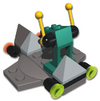 Hover Scout |
1 Energy Crystal[21] | Rock Raider, Tool Store (L1), Teleport Pad (L1), Power Station (L1), Support Station[21] | Engine (10 Ore), Scanner (5 Ore)[21] |
| A small terrestrial vehicle that a single Rock Raider can use for reconnaissance. Rock Raiders must be trained as Drivers to use it. | |||
 Small Digger |
1 Energy Crystal[22] | Rock Raider, Tool Store (L1), Teleport Pad (L1), Power Station (L1), Support Station[22] | Engine (10 Ore), Drill (10 Ore), Scanner (5 Ore)[22] |
| A small terrestrial vehicle with chainsaws that can cut through Dirt and Loose Rock faster than a Rock Raider. It can drill Hard Rock, but it takes three minutes per wall. Despite its appearance, it cannot carry anything. Rock Raiders must be trained as Drivers to use it. | |||
 Small Transport Truck |
2 Energy Crystals[23] | Rock Raider, Tool Store (L1), Teleport Pad (L1), Power Station (L1), Support Station[23] | Engine (10 Ore), Scanner (5 Ore), Cargo Hold (5 Ore)[23] |
| A small terrestrial vehicle that can carry three Energy Crystals or pieces of Ore, or one Electric Fence. It cannot carry Building Studs, Barriers, or Dynamite. It can be upgraded to carry six resources at once. Rock Raiders must be trained as Drivers to use it. | |||
 Rapid Rider |
2 Energy Crystals[7] | Rock Raider, Tool Store (L1), Teleport Pad (L1), Docks, Power Station[7] | None[a] |
| A small water-based vehicle that can travel across underground rivers and lakes. It can carry a single Energy Crystal or piece of Ore if a Rock Raider is holding one while boarding. Rock Raiders must be trained as Sailors to use it. | |||
 Small Mobile Laser Cutter |
3 Energy Crystals[24] | Rock Raider, Tool Store (L1), Teleport Pad (L2), Power Station (L1), Support Station (L1)[24] | Drill (10 Ore)[25][b] |
| A small terrestrial vehicle with a laser beam that can cut through rock at near-useless speeds. Click on the vehicle while it is already selected to enter or exit firing mode. Two laser blasts drain one Energy Crystal. Rock Raiders must be trained as Drivers to use it. | |||
 Tunnel Scout |
3 Energy Crystals[26] | Rock Raider, Tool Store (L1), Teleport Pad (L2), Power Station (L1), Support Station (L1)[26] | None[26] |
| A small flying vehicle that can travel over land, water, and lava. Rock Raiders must be trained as Pilots to use it. | |||
 Loader Dozer |
4 Energy Crystals[27] | Rock Raider, Tool Store (L1), Teleport Pad (L1), Power Station (L1), Support Station (L2), Super Teleport[4] | Engine (20 Ore), Scanner (5 Ore), Cargo Hold (5 Ore)[27] |
| A large bulldozer that can clear rubble faster than a Rock Raider. It can be upgraded to carry resources, though this can distract it from clearing rubble. Rock Raiders must be trained as Drivers to use it. | |||
 Granite Grinder |
3 Energy Crystals[28] | Rock Raider, Tool Store (L1), Teleport Pad (L1), Power Station (L1), Support Station (L2), Super Teleport[28] | Engine (20 Ore), Drill (20 Ore), Scanner (5 Ore)[28] |
| A large drilling vehicle that walks across land on a pair of legs. Despite its size, it drills through Hard Rock at the same speed as the Small Digger. Rock Raiders must be trained as Drivers to use it. | |||
 Large Mobile Laser Cutter |
4 Energy Crystals[29] | Rock Raider, Tool Store (L1), Teleport Pad (L1), Power Station (L1), Support Station (L2), Super Teleport (L1)[29] | Drill (25 Ore), Scanner (5 Ore)[29] |
| A large terrestrial vehicle with a laser beam that, despite its size, is not very fast at mining. Click on the vehicle while it is already selected to enter or exit firing mode. Four laser blasts drain one Energy Crystal. Rock Raiders must be trained as Drivers to use it. | |||
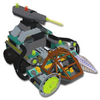 Chrome Crusher |
5 Energy Crystals[30] | Rock Raider, Tool Store (L1), Teleport Pad (L1), Power Station (L1), Support Station (L2), Super Teleport (L1)[30] | Engine (15 Ore), Drill (20 Ore)[30] |
| A large terrestrial vehicle with a powerful drill and a laser beam. Its side-mounted drill makes it difficult to use in first-person mode. Despite its appearance, it cannot scan or carry anything. Click on the vehicle while it is already selected to enter or exit firing mode. Four laser blasts drain one Energy Crystal. Rock Raiders must be trained as Drivers to use it. | |||
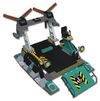 Cargo Carrier |
4 Energy Crystals[8] | Rock Raider, Tool Store (L1), Teleport Pad (L1), Docks, Power Station (L1), Support Station (L2), Super Teleport (L1)[8] | None[8] |
| A large water-based vehicle that can carry a Small Digger or Small Transport Truck across underground rivers and lakes. Click on "load vehicle" to carry a vehicle, though the vehicle it carries cannot be selected. Rock Raiders must be trained as Sailors to use it. | |||
| Tunnel Transport | None | Cannot be teleported | None |
| A large cargo helicopter intended to carry vehicles and resources. It is not useable, though it can be modded back into the game. | |||
Creatures
| Creature | Description | Damage |
|---|---|---|
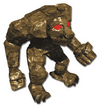 Rock Monster |
A large humanoid? bipedal? creature made of rock that eats Energy Crystals. | Laser Beam: 110 Pusher Beam: 2 (20u) Freezer Beam: 5 (25s) |
 Ice Monster |
Immune to freezer beams. | Laser beam: 110 Pusher Beam: 2 (60u) Freezer Beam: 0 |
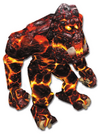 Lava Monster |
Can cross lava | Laser Beam: 1 Pusher Beam: 5 (60u) Freezer Beam: 40 (75s) |
 Slimy Slug |
Giant slugs that suck power. Can crawl under Electric Fences. | Laser Beam: 5 Pusher Beam: 5 (60u) Freezer Beam: 0 |
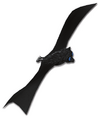 Bat |
Flocks of bats can be found in some missions. Bats are harmless, but will scare away nearby Rock Raiders. | None |
 Small Spider |
Small Spiders are common, harmless creatures resembling large eight-legged ants. Rock Raiders will slip and fall if they step on one. Small Spiders will crawl around on the ground until encountering a wall, which they will enter, causing them to disappear. They also disappear when stepped on. | Getting stepped on |
Missions
| Level | Missions | ||||||
|---|---|---|---|---|---|---|---|
| Brown (Tutorials) |
|||||||
| Yellow | 1 | Driller Night! | |||||
| 2 | The Path To Power • Rubble Trouble! | ||||||
| 3 | A Breath Of Fresh Air • It's A Hold Up • Explosive Action | ||||||
| Green | 4 | Search 'n' Rescue • Breathless | |||||
| 5 | Frozen Frenzy | ||||||
| 6 | Erode Works • Water Lot Of Fun | ||||||
| Blue | 7 | Water Works • Rock Hard • Don't Panic! | |||||
| 8 | Ice Spy • Split Down The Middle | ||||||
| 9 | Lava Laughter | ||||||
| Purple | 10 | Oresome! • Fire 'n' Water | |||||
| 11 | Run The Gauntlet • Air Raiders • Lake Of Fire | ||||||
| 12 | Back To Basics • Hot Stuff | ||||||
| Red | 13 | Rocky Horror | |||||
PlayStation version
The PS version is an action and strategy game.
Vehicles
- Chrome Crusher
- Hover Scout
- Large Mobile Laser Cutter
- Loader Dozer
- Rapid Rider
- Small Digger
- Small Mobile Laser Cutter
- Tunnel Scout
- Tunnel Transport
Alien lifeforms
Missions
Missions are divided into different screens (or "levels"), with each screen having five open missions and one locked "boss" mission. Completing missions will give the player a bronze, silver, or gold medal, depending on how many objectives they completed. When the player has earned enough points (a minimum of five bronze, four silver, or three gold medals) the boss mission opens, which will unlock the next screen when completed.
One-player mode has eighteen missions divided between three screens. The missions are completely different between the European and North American versions. The European version also has three bonus missions, each one unlocked by getting gold medals in all missions in one of the three previous screens. The European missions were designed by Data Design Interactive[31] and David Upchurch,[32] while the North American missions were designed by Gameworld 7.[33]
Two-player mode in the European version also has eighteen missions, five original ones and thirteen modified one-player missions. The North American version only has one level of six original missions. Boss missions start off unlocked in two-player mode.
In total, the two versions of the game have fifty unique missions between them, and sixty-three total missions, listed below:
| Europe (PAL) | North America (NTSC-U/C) | |||
|---|---|---|---|---|
| Level | One-player | Two-player | One-player | Two-player |
| 1 | ||||
| 2 | –
| |||
| 3 | –
| |||
| 4 | –
|
–
|
–
| |
Development
For the first time in Lego history, children can play with the toy and then hop on the computer and play within the same Lego universe there. We hope that what they see and experience in the CG version will inspire them to go off and build and play with the toy, and vice versa.
Tomas Gillo, Computer Graphics World[34]
LEGO Rock Raiders was the first LEGO video game to be developed concurrently with LEGO construction sets. The LEGO Rock Raiders theme followed a new policy where development of the construction sets and the tie-in video game would influence each other, creating a larger universe for both products.[34][35] LEGO Futura, the product development division of the LEGO Group, co-created the theme's concept with LEGO Media International, the company's software publishing branch. Development of the game began in October 1997, shortly after the release of LEGO Island, when LEGO Media approached British video game developer Data Design Interactive to create the game.[36][37] LEGO Media presented concepts for the then-upcoming LEGO Rock Raiders theme to the developers at Data Design, including ideas for the theme's characters, buildings, vehicles, creatures, and story. Data Design had recently finished development of Conquest Earth, a strategy game for Eidos Interactive, and decided that the LEGO Rock Raiders storyline would work best as a strategy game as well.[38]
LEGO Media was heavily involved in the development of LEGO Rock Raiders.[38] Tomas Gillo, the head of concept development at LEGO Media,[34] became the game's senior producer.[39] David Upchurch, a producer from LEGO Media, frequently visited Data Design for a week at a time to play through the game and give feedback.[38]
The unified development process of the toys and game led to some design issues, according to head artist Rob Dorney. Early in the game’s design process, LEGO Futura would send storyboards and prototype LEGO models to the game developers, who would give feedback on what worked with their vision for the game and make suggestions when ideas didn't work. Both groups often did not receive finalised model designs from the other until late in development.[34] Although the LEGO Rock Raiders sets took only eight months to develop,[35] the game's design process ended up lasting for eighteen months, longer than usual for Data Design Interactive, as both groups had to adjust elements on their ends to create a cohesive product between the video game and LEGO sets. Despite these issues, the "parallel" development of the project was considered a success.[34]
The developers at Data Design and LEGO Media both spent some time trying to balance the gameplay of LEGO Rock Raiders to be challenging and fun while still being easy and accessible for children to play. The inherent complexity of strategy games and the younger target audience of both the game and LEGO sets made finding this balance a difficult task. The game was designed to introduce the player to new features gradually enough that they could improve and prepare for later challenges without feeling overwhelmed. Levels start out being simple mining missions early on, gradually introducing creatures, natural hazards, and larger maps as the player progresses through the game.[38]
The game's atmosphere was inspired by Scandinavian mines.[40]
The developers could not make the game too creepy or violent, and made sure to not show any serious injuries. “We were very aware of the audience and of how violence is seen within the LEGO world,” developer Karl White said in 2021. Entities in the game have health indicators, and minifigures and vehicles are safely teleported out of the level and back to the LMS Explorer when their health runs too low. Despite this, players still felt a sense of attachment and a fear of loss, according to White. Creatures were also designed to never be killed or destroyed, and instead can be pushed away and will eventually leave. Many creatures were revised multiple times.[38]
Art and graphics

After LEGO Media International approached Data Design Interactive to develop LEGO Rock Raiders in 1997, the studio set up a sister company, Artworld UK, to serve as a dedicated graphics and animation team for the game.[37] A team of twelve artists and animators at Artworld created most of the game's 3D models and animations with LightWave 3D, using a number of third-party plugins and running on high-end Windows NT workstations. Adobe Photoshop and Kai's Power Tools were used to create textures for the models.[34] Rob Dorney headed the art department at Artworld,[37] while Dave Garbett was head of animation.[41]
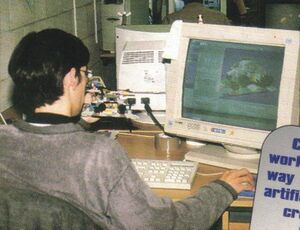
The virtual LEGO models used in the game were required to appear identical to the physical LEGO Rock Raiders sets.[42] Artists took apart physical LEGO models and recreated each individual piece in LightWave 3D. The completed virtual LEGO pieces were added to a database, which LightWave could access using a set of plugins created by Artworld programmers. The colours used in the LEGO Rock Raiders sets were also programmed into the database. When artists needed to create a virtual LEGO construction, pieces from the database could be selected and coloured as needed. Once all of the desired pieces for a model were selected, another Artworld plugin generated a LightWave Scene file containing all of the coloured LEGO pieces, which the artists could assemble in the scene like a physical LEGO model.[34]
The LEGO Rock Raiders sets used in the game were designed at LEGO Futura in Billund, Denmark, as were parts of the LMS Explorer spaceship seen in the game's FMV sequences.[42] While the sets were limited by the number of pieces that could be included and sold, the virtual world of the video game allowed for the creation of additional characters, buildings, vehicles, and environments. Artists working on the game designed a number of game-exclusive buildings and vehicles, using the same LEGO elements as the Rock Raiders sets did, to create a more in-depth gaming experience and expand the Rock Raiders universe.[34][43]
The characters in the game each had unique animated facial textures and movements to give them all distinctive personalities. The animators initially found it difficult to make the inanimate LEGO toys feel alive, particularly due to the stiff nature of LEGO minifigures. LEGO Media reluctantly allowed the animators to deviate from LEGO toy design rules by making the virtual minifigures more flexible. Minifigures were given elbow and knee joints and torsos that could twist to allow for more realistic character movement.[34]
As the completed 3D models each contained thousands of polygons, which computers at the time running the game could not have handled, simplified versions had to be created for in-game use. Artists created new models with lower polygon counts, and used extensive texturing to maintain the appearance of LEGO pieces. Reflections, shadows, and lighting effects were used to make objects and textures appear more detailed than they were. Once completed, the LightWave models and animations could be directly loaded into the game's engine. The game would still end up requiring a 3D accelerator card to run on Windows.[34]
Prior to the release of LEGO Rock Raiders, Data Design Interactive also completed FMV animations for two other LEGO video games: LEGO Chess,[44] which released in November 1998, and LEGO Racers,[37] released in August 1999.
Sound and music
The characters in the game were voiced by Data Design Interactive employees. Chief was voiced by the game's project manager, while Jet was voice by the studio's office coordinator.[38]
The three music tracks that play during levels were composed by Marl Boonyer[c] and produced by Alan Boorman in 1998.[45][46]
PlayStation revamp
In early 1999, six months before the PlayStation version of LEGO Rock Raiders was supposed to be submitted to Sony, the head of LEGO Media International decided that a real-time strategy game would not sell on the PlayStation.[d] The game was ordered to be changed to an action game. As senior producer Tomas Gillo[e] did not have time to rework the PlayStation game while finishing the Windows version, David Upchurch was made the producer for the PlayStation version in March 1999.[32] Upchurch had previously worked as producer for LEGO Chess and early versions of what would later become LEGO Island 2.[44][47]
...every night I’d retire to my hotel room, exhausted, thinking to myself “That was a good day, we made good progress… but the game’s still going to crap.” All in all, it was a depressing and demoralising experience that soured my attitude towards working at LEGO Media.
David Upchurch, dupchurch.com[32]
After many strategy-focussed elements were removed from the PlayStation game, the developers were left with a 3D rendering engine that could deform terrain, some vehicle models, and small minifigure sprites. Upchurch enjoyed controlling the vehicles and suggested making the game a hybrid between Gauntlet and Blast Corps, where the player could complete missions either on-foot or in vehicles, and could construct vehicles and decide how to best use them to traverse caverns.[32]
As the game's submission date approached, Upchurch spent nearly two months living in Birmingham while he worked on it with Data Design Interactive, playtesting and designing levels for it. After finishing work on LEGO Rock Raiders in August 1999, Upchurch left LEGO Media, going on to launch PlayStation World magazine for Computec Media in 2000. He later cited his negative experience producing this game as a major reason for leaving.[32][48]
Release
LEGO Rock Raiders was first announced on 10 February 1999, along with LEGO Racers, LEGO Friends, and LEGOLAND. It was initially scheduled for release on Windows and PlayStation in September 1999, with a planned retail price of US$40–$45.[49][50] In May 1999 all four titles were displayed at E3 1999 in Los Angeles, at the LEGO Media booth #1524 in the South Hall. A large LEGO model of Jet on a Hover Scout was built by model designers from LEGO Systems during the event. LEGO models of Rocket Racer's car and of PlayStation and Nintendo 64 controllers were also constructed before the event; the controllers were given to the winners of a contest involving the car.[51][52]
Soundtrack
An extended play soundtrack, RockRaiders Music, was released on Marl Boonyer's Bandcamp page "Temple Sound" on 23 August 2022. It was originally priced at £4 GBP, later lowered to £3 by December 2022.[46][53] The album contains the original masters of the three tracks that play during missions.
| No. | Title | Length |
|---|---|---|
| 1. | "Rock" | 3:03 |
| 2. | "Ice" | 3:26 |
| 3. | "Lava" | 3:05 |
| Total length: | 9:35 | |
Reception
The game received mixed reviews.
Legacy
Write something about the game's modding scene, with links to pages about mods and modding.
In 2012, Data Design Interactive founder Stewart Green announced plans to develop a Rock Raiders sequel.[54]
Manic Miners
Notes
- ↑ The instruction manual lists three upgrades, however these do not exist in the published game.
- ↑ Incorrectly listed as 15 Ore in the instruction manual.
- ↑ Credited as Mark Boobyer.
- ↑ Hypothesised by Upchurch to be due to poor sales of Command & Conquer.
- ↑ Only listed as "the original Producer" by Upchurch; inferred from the game's credits, which lists Gillo as Senior Producer.
References
- ↑ a b c d e Instruction Manual, p. 61.
- ↑ Instruction Manual, p. 30.
- ↑ a b c Instruction Manual, p. 62.
- ↑ a b c d e f g h i j k l m Main Lego Config File, lines 3237–3265.
Dependencies {}section. - ↑ a b Main Lego Config File, line 609–656.
HelpWindowInfo {}section. - ↑ a b c Instruction Manual, p. 63.
- ↑ a b c Instruction Manual, p. 75.
- ↑ a b c d Instruction Manual, p. 82.
- ↑ a b c Instruction Manual, p. 64.
- ↑ Instruction Manual, p. 46.
- ↑ Instruction Manual, p. 47.
- ↑ a b c Instruction Manual, p. 65.
- ↑ a b c Instruction Manual, p. 66.
- ↑ Main Lego Config File, line 2950–966.
Upgrade {}section. - ↑ a b c Instruction Manual, p. 67.
- ↑ Main Lego Config File, line 2932–2948.
Geo-dome {}section. - ↑ a b c Instruction Manual, p. 68.
- ↑ a b c Instruction Manual, p. 69.
- ↑ Cite error: Invalid
<ref>tag; no text was provided for refs namedPC manual p42 - ↑ a b c d Instruction Manual, p. 70.
- ↑ a b c Instruction Manual, p. 72.
- ↑ a b c Instruction Manual, p. 73.
- ↑ a b c Instruction Manual, p. 74.
- ↑ a b Instruction Manual, p. 76.
- ↑ Main Lego Config File, line 2548–2568.
Smallmlp {}section. - ↑ a b c Instruction Manual, p. 77.
- ↑ a b Instruction Manual, p. 78.
- ↑ a b c Instruction Manual, p. 79.
- ↑ a b c Instruction Manual, p. 80.
- ↑ a b c Instruction Manual, p. 81.
- ↑ Data Design Interactive (November 1999). LEGO Rock Raiders (PlayStation, PAL). LEGO Media International. Credits. "LEVEL DESIGNERS — David Allen – Scott Campbell – Scott Newby – Aron Phelan".
- ↑ a b c d e Upchurch, David (2012). "LEGO Rock Raiders (PS1)". dupchurch.com. Archived from the original on 18 January 2019.
- ↑ Data Design Interactive (17 August 2000). LEGO Rock Raiders (PlayStation, NTSC-U/C). LEGO Media International. Credits. "LEVEL DESIGN — Gameworld Seven Ltd".
- ↑ a b c d e f g h i j Moltenbrey, Karen (March 2000). "Legos Come to Life". Computer Graphics World. Volume 23, Issue 3. CGW Magazine. Archived from the original on 18 January 2023.
- ↑ a b Pickering, David; Turpin, Nick; Jenner, Caryn (eds.) (1999). "The Design Concept". The Ultimate LEGO Book. DK publishing. pp. 30–31. ISBN 0-7894-4691-X.
- ↑ Behind the Scenes
- ↑ a b c d Younghusband, Paul (February 2001). "A One Stop Digital Shop: Data Design Interactive and Artworld UK". Animation World Magazine. Vol. 5, No. 11. AWN, Inc. Archived from the original on 18 January 2023. Mirror available at Animation World Network.
- ↑ a b c d e f Crecente, Brian; Vincent, Ethan (14 July 2021). "The Fans, Devs, and Remake of Real-Time Strategy Classic LEGO® Rock Raiders". Bits N' Bricks. The LEGO Group. Archived from the original on 19 January 2023.
- ↑ Data Design Interactive (15 November 1999). LEGO Rock Raiders (Windows). LEGO Media International. Credits. "Tomas Gillo - Senior Producer".
- ↑ Pickering, David; Turpin, Nick; Jenner, Caryn (eds.) (1999). "Media Magic". The Ultimate LEGO Book. DK publishing. pp. 26–27. ISBN 0-7894-4691-X.
- ↑ Data Design Interactive (15 November 1999). LEGO Rock Raiders (Windows). LEGO Media International. Credits. "Dave Garbett - Head Of Animation".
- ↑ a b Yeo, Matt (ed.) (October 1999). "Behind the Scenes: Rock Raiders". LEGO Adventures!. Issue 7. Egmont Fleetway Ltd. pp. 30–33. ISSN 1465-0738.
- ↑ Staff (August 1999). "Danger Underground". Bricks 'n' Pieces. Issue 70. LEGO UK Ltd. pp. 4–5.
- ↑ a b Upchurch, David (2012). "LEGO Chess (PC)". dupchurch.com. Archived from the original on 21 August 2018.
- ↑ Data Design Interactive (15 November 1999). LEGO Rock Raiders (Windows). LEGO Media International. Credits. "Thanks also to Mark Boobyer and Alan Boorman for their musical contribution."
- ↑ a b Boonyer, Marl (23 August 2022). RockRaiders Music by Temple Sound. Bandcamp. "Composed and produced in 1998 by Marl Boonyer & Alan Boorman". Archived from the original on 26 August 2022.
- ↑ Upchurch, David (2012). "LEGO Island 2 (Various)". dupchurch.com. Archived from the original on 21 August 2018.
- ↑ Upchurch, David (2012). "PSW: Playstation World". dupchurch.com. Archived from the original on 21 August 2018.
- ↑ Fudge, James (10 February 2009). "LEGO Announces 4 New Titles". Computer Games Strategy Plus. Strategy Plus, Inc. Archived from the original on 29 November 2002.
- ↑ IGN Staff (11 February 1999). "It's a Snap". IGN. Ziff Davis. Archived from the original on 18 January 2023 (Oldest on 1 September 2000).
- ↑ Fudge, James (11 May 1999). "Lego Media at E3". Computer Games Strategy Plus. Strategy Plus, Inc. Archived from the original on 29 November 2002.
- ↑ IGN Staff (11 May 1999). "Lego Media's E3 Lineup". IGN. Ziff Davis. Archived from the original on 18 January 2023 (Oldest on 9 March 2000).
- ↑ Boonyer, Marl (23 August 2022). RockRaiders EP by Temple Sound. Bandcamp. Archived from the original on 9 December 2022. The price has been lowered to £3 GBP from the previous archive in late November.
- ↑ Green, Stewart [StewartG] (26 August 2012). "DDI looking for help with new Rock Raiders title". Rock Raiders United. Archived from the original on 18 January 2023. Original topic name archived 26 July 2013.
Cite error: <ref> tag with name "bandcamp EP" defined in <references> is not used in prior text.
Cite error: <ref> tag with name "avault" defined in <references> is not used in prior text.
Cite error: <ref> tag with name "cdmag review" defined in <references> is not used in prior text.
Cite error: <ref> tag with name "gamespot review" defined in <references> is not used in prior text.
Cite error: <ref> tag with name "ign review" defined in <references> is not used in prior text.
<ref> tag with name "pc games review" defined in <references> is not used in prior text.Sources
- McPhail, Jim (13 December 1999). LEGO Rock Raiders Instruction Manual (UK FRONT, BACK, I/F & I/B COVER). LEGO Media International. Serial: IB2G-ROC3 2299598.
- Data Design Interactive (last modified 25 September 1999). Main Lego Config File. File path:
Rock Raiders\LegoRR1.wad\Lego.cfg.
External Links
- Lego Rock Raiders at Wikipedia
- LEGO Rock Raiders for Windows at MobyGames
- RockRaiders EP at Bandcamp
